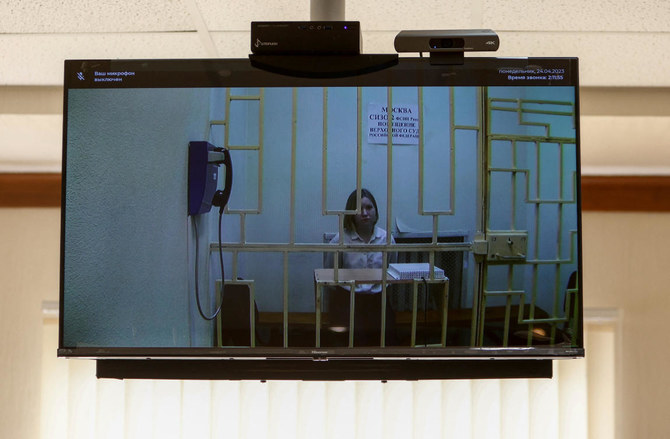A Russian court denied bail on Monday to a woman charged with terrorism over a bomb attack that killed a pro-war Russian military blogger earlier this month.
Prosecutors have accused Darya Trepova, 26, of killing blogger Vladlen Tatarsky, whose real name was Maxim Fomin, by presenting him with an explosive device concealed within a statuette at a public talk he was giving in a St. Petersburg cafe on April 2.
Investigators say she was working on behalf of a pro-Ukrainian group with connections to jailed Kremlin critic Alexei Navalny — claims rejected by Navalny’s associates and Kyiv — and charged her with terrorist offenses.
A court in Moscow on Monday rejected Trepova’s appeal against being held in pre-trial detention until at least June 2. The appeal was largely procedural and did not concern the substance of the charges against her.
Trepova said she regretted what had happened and wished a speedy recovery to other victims, the TASS news agency reported from the court. More than 40 others were injured in the blast.
Trepova’s husband previously told independent Russian media outlets he believed she had been framed and had not known the statuette she had been told to deliver contained explosives.
Tatarsky was among the best-known of an influential group of bloggers who have surged to prominence since Russia invaded Ukraine. They have often been scathing in their criticism of Russia’s defense establishment and its conduct of the war, pushing for a more aggressive assault on Ukraine.
Last year, in a video shot at a ceremony in the Kremlin to mark Russia’s unilateral annexation of four Ukrainian regions, Tatarsky said Russia should “kill everyone” and “rob everyone” in Ukraine.
Russian woman loses appeal against detention over bomb that killed military blogger
https://arab.news/nckga
Russian woman loses appeal against detention over bomb that killed military blogger

- Prosecutors have accused Darya Trepova of killing blogger Vladlen Tatarsky by presenting him with an explosive device concealed within a statuette
WHO chief says reasons US gave for withdrawing ‘untrue’

- US Secretary of State Marco Rubio and US Health Secretary Robert F. Kennedy Jr. announced in a joint statement Thursday that Washington had formally withdrawn from the WHO
- And in a post on X, Tedros added: “Unfortunately, the reasons cited for the US decision to withdraw from WHO are untrue”
GENEVA: The head of the UN’s health agency on Saturday pushed back against Washington’s stated reasons for withdrawing from the World Health Organization, dismissing US criticism of the WHO as “untrue.”
Tedros Adhanom Ghebreyesus warned that US announcement this week that it had formally withdrawn from the WHO “makes both the US and the world less safe.”
And in a post on X, he added: “Unfortunately, the reasons cited for the US decision to withdraw from WHO are untrue.”
He insisted: “WHO has always engaged with the US, and all Member States, with full respect for their sovereignty.”
US Secretary of State Marco Rubio and US Health Secretary Robert F. Kennedy Jr. announced in a joint statement Thursday that Washington had formally withdrawn from the WHO.
They accused the agency, of numerous “failures during the Covid-19 pandemic” and of acting “repeatedly against the interests of the United States.”
The WHO has not yet confirmed that the US withdrawal has taken effect.
- ‘Trashed and tarnished’ -
The two US officials said the WHO had “trashed and tarnished” the United States, and had compromised its independence.
“The reverse is true,” the WHO said in a statement.
“As we do with every Member State, WHO has always sought to engage with the United States in good faith.”
The agency strenuously rejected the accusation from Rubio and Kennedy that its Covid response had “obstructed the timely and accurate sharing of critical information that could have saved American lives and then concealed those failures.”
Kennedy also suggested in a video posted to X Friday that the WHO was responsible for “the Americans who died alone in nursing homes (and) the small businesses that were destroyed by reckless mandates” to wear masks and get vaccinated.
The US withdrawal, he insisted, was about “protecting American sovereignty, and putting US public health back in the hands of the American people.”
Tedros warned on X that the statement “contains inaccurate information.”
“Throughout the pandemic, WHO acted quickly, shared all information it had rapidly and transparently with the world, and advised Member States on the basis of the best available evidence,” the agency said.
“WHO recommended the use of masks, vaccines and physical distancing, but at no stage recommended mask mandates, vaccine mandates or lockdowns,” it added.
“We supported sovereign governments to make decisions they believed were in the best interests of their people, but the decisions were theirs.”
- Withdrawal ‘raises issues’ -
The row came as Washington struggled to dislodge itself from the WHO, a year after US President Donald Trump signed an executive order to that effect.
The one-year withdrawal process reached completion on Thursday, but Kennedy and Rubio regretted in their statement that the UN health agency had “not approved our withdrawal and, in fact, claims that we owe it compensation.”
WHO has highlighted that when Washington joined the organization in 1948, it reserved the right to withdraw, as long as it gave one year’s notice and had met “its financial obligations to the organization in full for the current fiscal year.”
But Washington has not paid its 2024 or 2025 dues, and is behind around $260 million.
“The notification of withdrawal raises issues,” WHO said Saturday, adding that the topic would be examined during WHO’s Executive Board meeting next month and by the annual World Health Assembly meeting in May.
“We hope the US will return to active participation in WHO in the future,” Tedros said Saturday.
“Meanwhile, WHO remains steadfastly committed to working with all countries in pursuit of its core mission and constitutional mandate: the highest attainable standard of health as a fundamental right for all people.”














